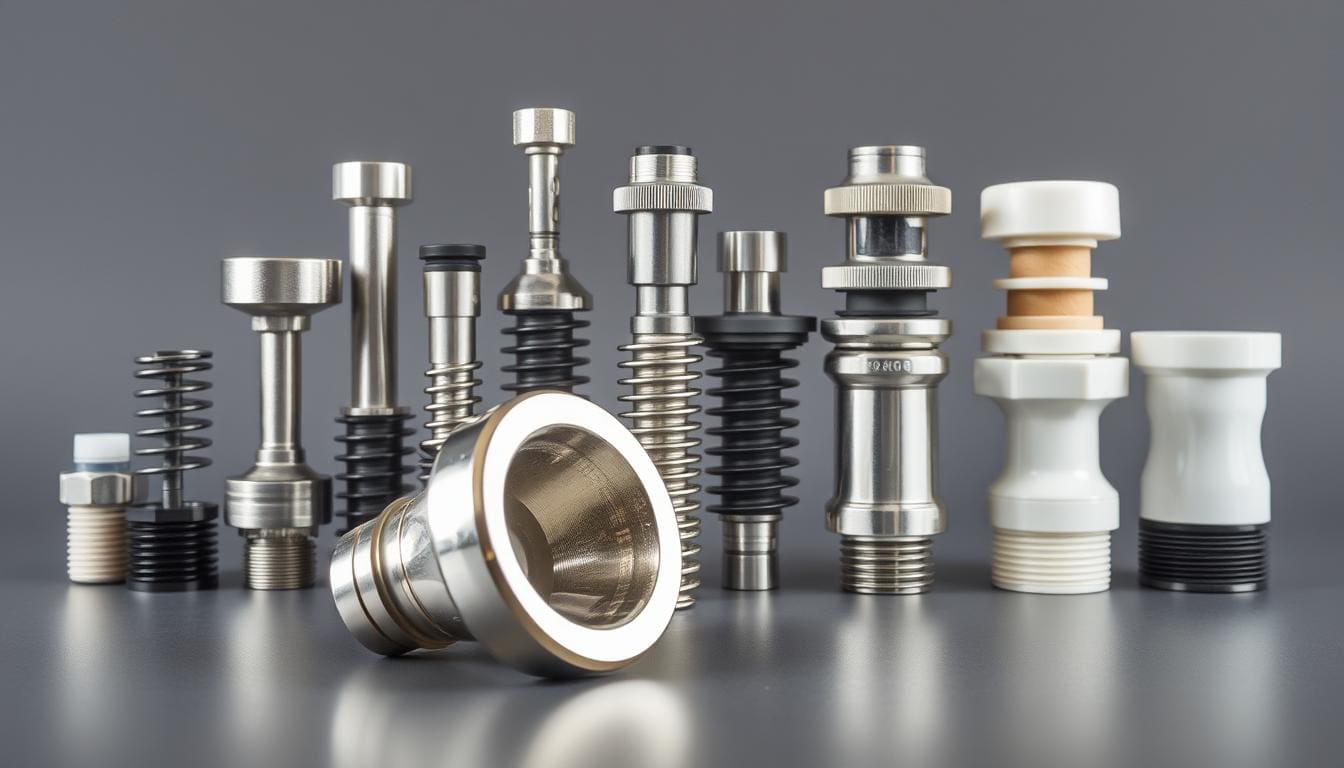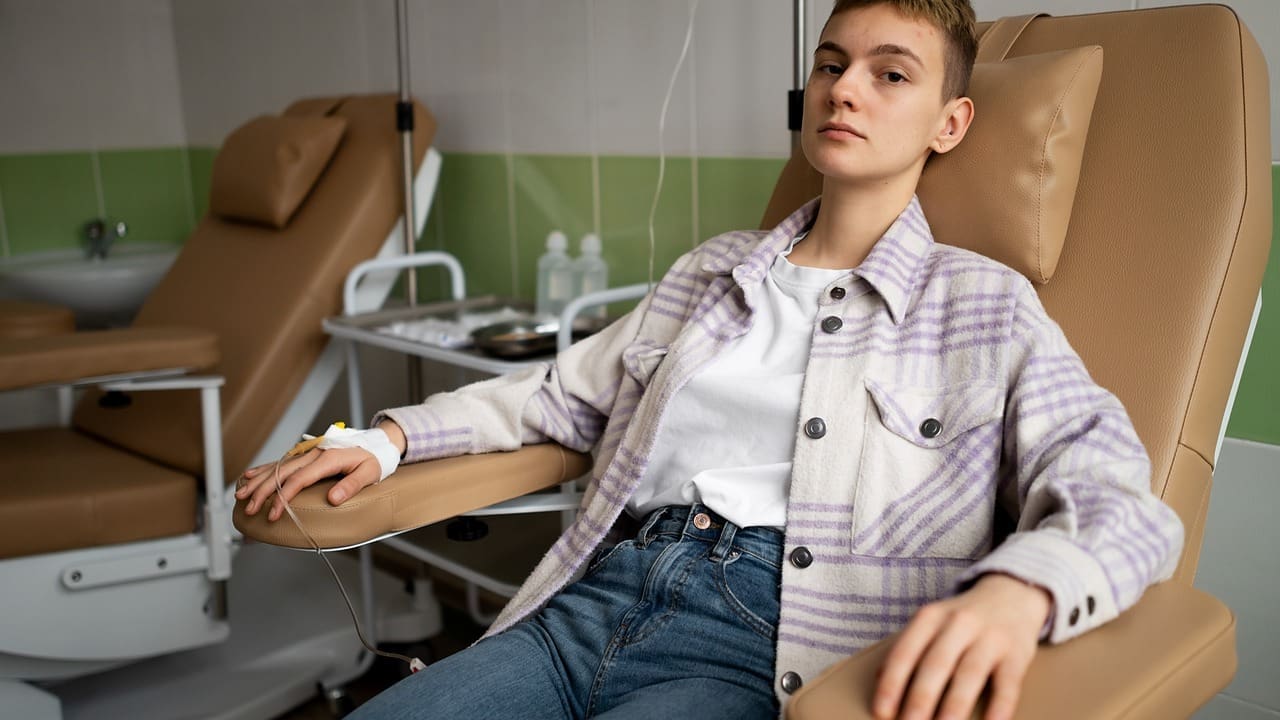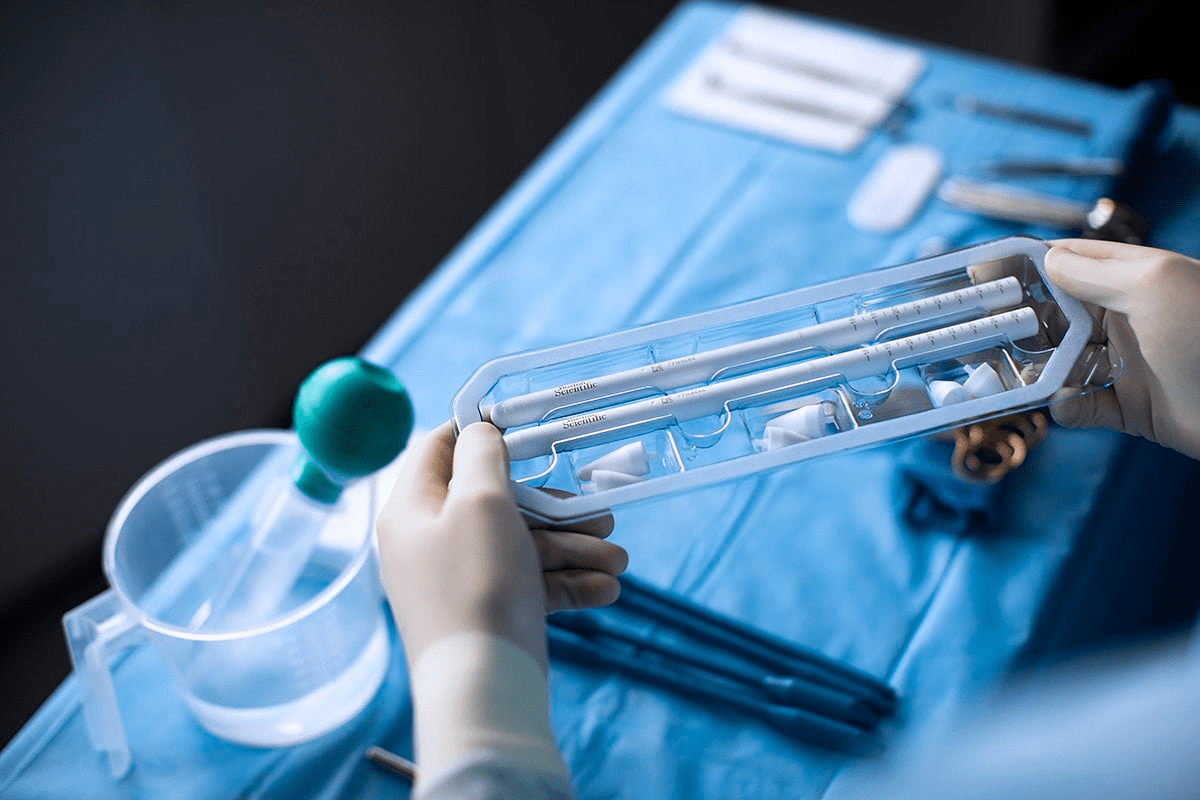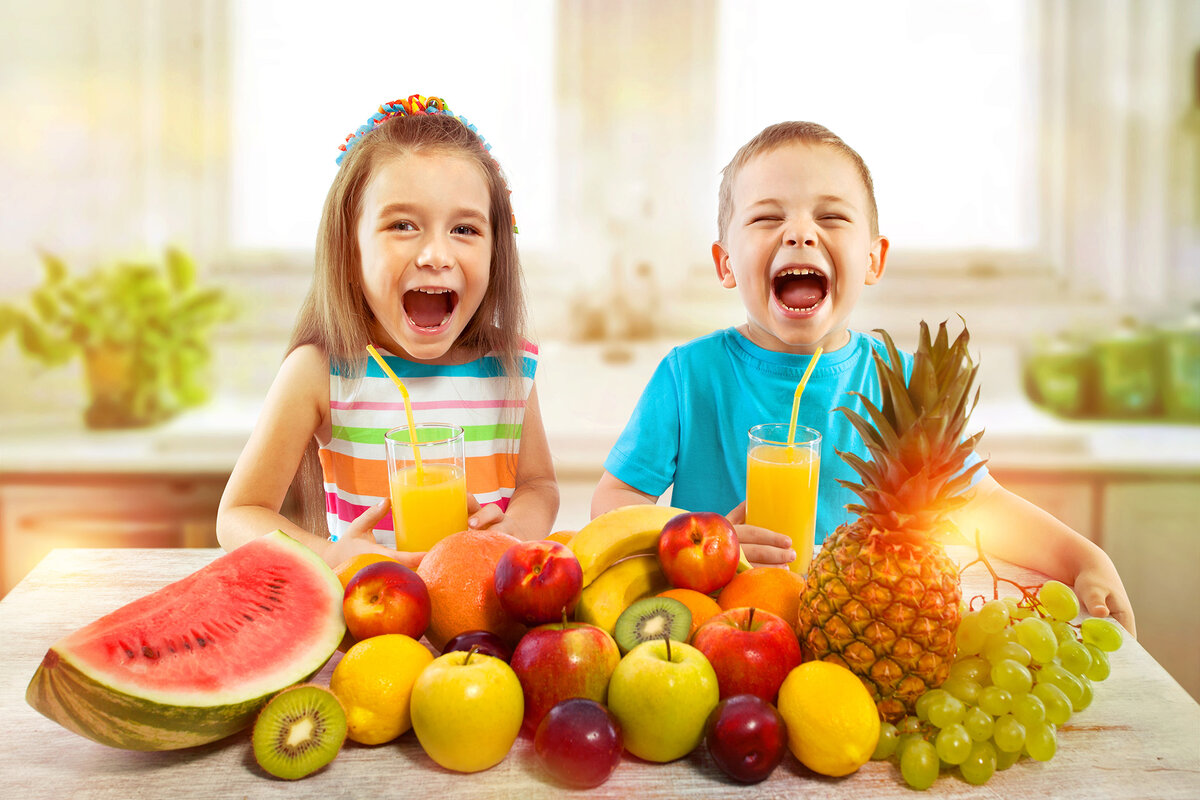Last Updated on November 26, 2025 by Bilal Hasdemir
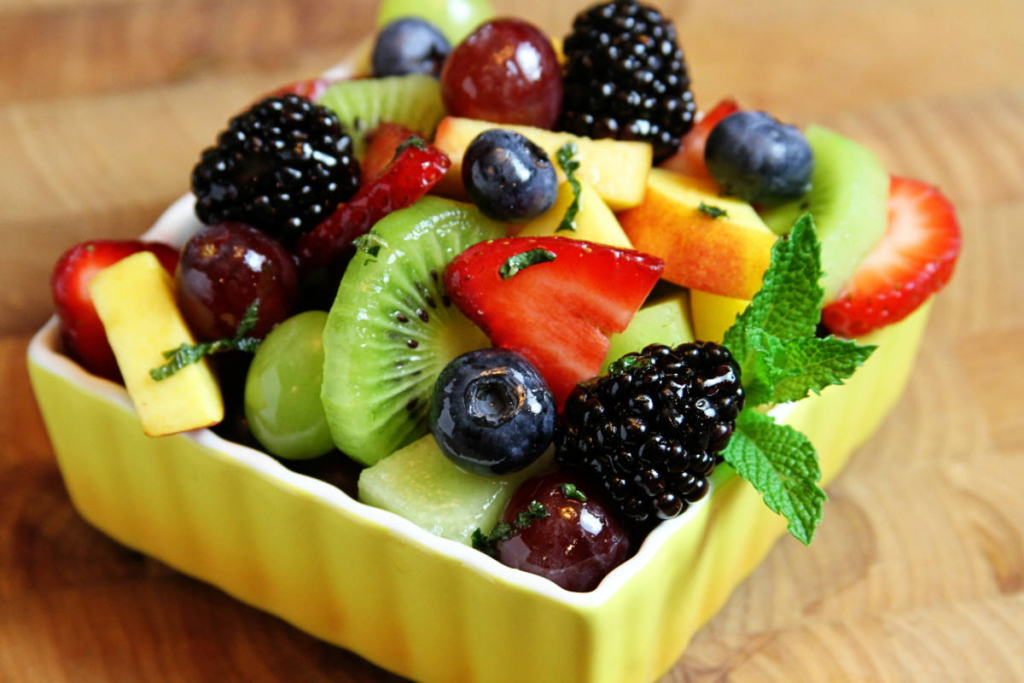
immune system and food
Cancer treatment is tough, and knowing what to eat is key. Chemotherapy hits not just cancer cells but also our immune response. So, it’s important to watch what we eat.
The American Cancer Society says chemotherapy weakens our defenses. It affects the blood cells that fight off diseases and germs. This means some foods, like fruits, might be off-limits during treatment to avoid risks.
We’ll look into how our immune response and food choices interact during chemo. This will help you make better health decisions.
Key Takeaways
- Chemotherapy affects the body’s immune response, making dietary choices crucial.
- Certain foods, including some fruits, may be restricted during chemotherapy.
- Understanding the connection between diet and immune function is vital during cancer treatment.
- A well-informed diet can help minimize potential risks associated with chemotherapy.
- Making informed dietary choices can support overall health during cancer treatment.
The Impact of Chemotherapy on Your Body
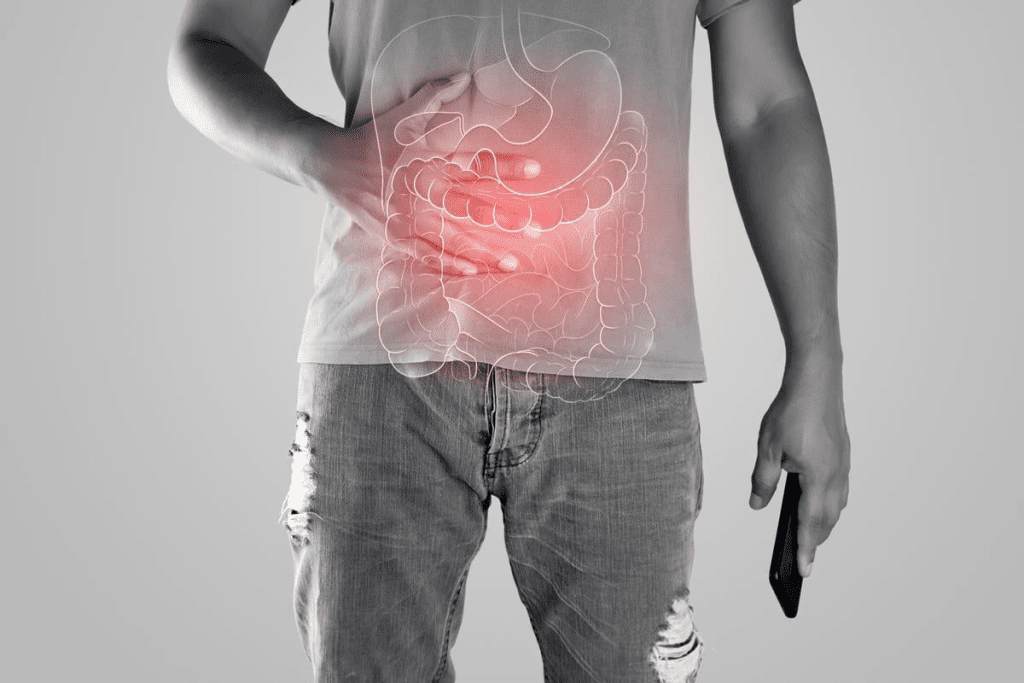
Chemotherapy does more than just fight cancer cells. It affects many parts of the body. It attacks not just cancer cells but also other fast-growing cells. This includes cells in the digestive system, bone marrow, and hair follicles.
How Chemotherapy Affects Your Cells and Digestive System
Chemotherapy drugs target fast-growing cancer cells. But they also harm other fast-growing cells, like those in the digestive tract. This can cause mucositis, leading to inflammation and ulcers in the mucous membranes.
This makes it hard for patients to eat and digest food. The digestive system is key during chemotherapy. It affects how the body takes in nutrients.
Common Side Effects That Influence Eating Habits
Chemotherapy can cause many side effects. These include constipation, diarrhea, fatigue, loss of taste, and nausea. These issues can greatly affect a patient’s diet and nutrition.
- Nausea and Vomiting: These side effects make it hard to keep food down.
- Loss of Taste: Changes in taste can make food less appealing.
- Fatigue: Lack of energy makes eating and meal prep hard.
Knowing about these side effects is key to managing diet during chemotherapy. Healthcare providers can give better nutrition advice by understanding these impacts.
Chemotherapy and Your Immune System
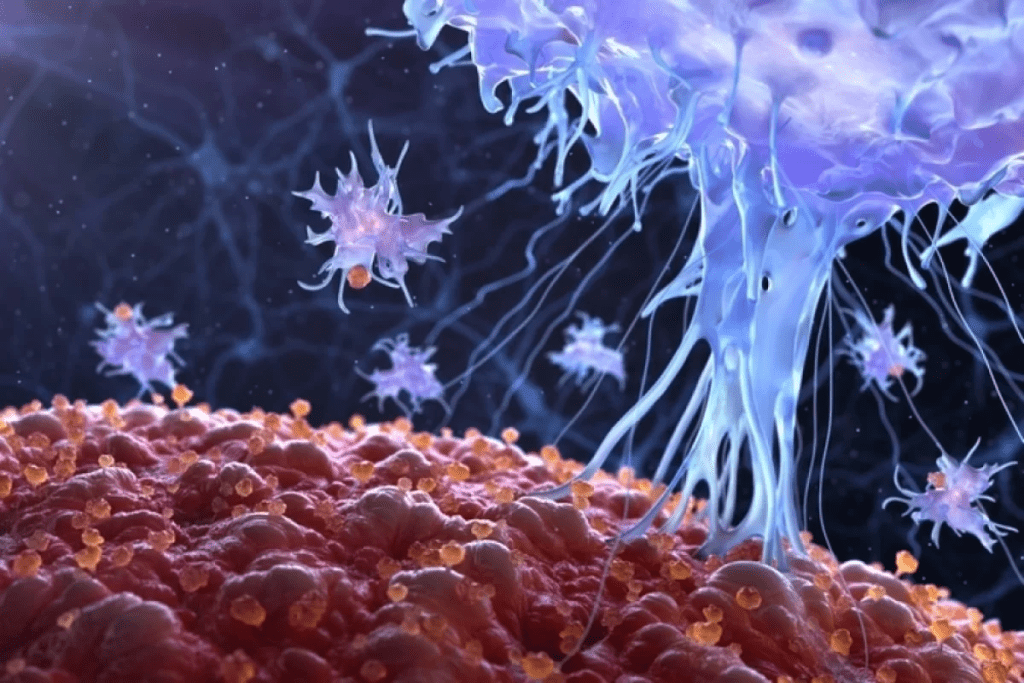
Chemotherapy weakens our immune system, making us more likely to get sick. It affects the cells that fight off diseases and germs.
One big worry with chemotherapy is neutropenia. This is when we have too few white blood cells. White blood cells help us fight off infections.
Neutropenia: Understanding Low White Blood Cell Counts
Neutropenia often happens when we get chemotherapy. It’s because the treatment affects the bone marrow where white blood cells are made. When we have fewer white blood cells, even small infections can become big problems.
Key facts about neutropenia include:
- It’s a condition that requires careful management to prevent infections.
- Regular blood tests are necessary to monitor white blood cell counts.
- Patients with neutropenia may need to adjust their daily activities to minimize infection risk.
Why Infection Risk Increases During Treatment
The risk of getting sick goes up when we’re getting chemotherapy. This is because the treatment targets not just cancer cells but also healthy cells, including those in our immune system. This weakens our immune system, making it harder to fight off infections.
Understanding the risks and taking proactive steps can help manage the challenges of a weakened immune system. This includes practicing good hygiene, avoiding close contact with people who are sick, and being cautious with food choices to minimize the risk of foodborne illnesses.
By being informed and taking the necessary precautions, we can better navigate the challenges of chemotherapy and support our immune system during this critical period.
The Connection Between Immune System and Food During Cancer Treatment
When you’re going through chemotherapy, it’s key to know how food affects your immune system. Cancer and treatment can weaken your immune system, making you more likely to get sick. It’s important to think about how what you eat affects your immune health.
How Food Safety Becomes Critical During Immune Suppression
When your immune system is down, keeping food safe is crucial. Your body can’t fight off bad bacteria and germs as well. Eating contaminated food or drinks can cause serious infections, especially when you’re on chemo.
To stay safe, follow strict food safety rules. This means:
- Handling food hygienically
- Avoiding high-risk foods that are more likely to be contaminated
- Cooking food thoroughly to kill bacteria and other pathogens
- Storing food properly to prevent cross-contamination
Common Foodborne Pathogens and Their Risks to Chemo Patients
Some foodborne pathogens are especially dangerous for people on chemo. Here are a few:
- Salmonella: Often found in raw poultry, eggs, and sometimes in produce like tomatoes and peppers.
- E. coli: Typically associated with undercooked ground beef, unpasteurized juice, and contaminated produce.
- Listeria: Can be present in soft cheeses, hot dogs, and deli meats, as well as in raw produce.
These pathogens can cause serious infections in people with weakened immune systems. Knowing the risks and taking the right steps can help lower your chance of getting sick from food during chemo.
Some foods are safer than others during chemo. For example, cooked foods are safer than raw foods because cooking kills bacteria. Paying attention to these differences can help you make better food choices.
Why Raw Fruits Are Often Restricted During Chemotherapy
When you’re on chemotherapy, your immune system gets weaker. This makes you more likely to get sick from raw fruits. Chemotherapy doesn’t just kill cancer cells; it also weakens your body’s defense against infections.
Bacterial Contamination Risks with Uncooked Produce
Raw fruits can carry harmful bacteria like Salmonella, E. coli, and Listeria. These germs can lead to serious illnesses in people with weak immune systems. For those undergoing chemotherapy, the risk is especially high because they can’t fight off infections as well as healthy people.
Cancer.org suggests avoiding raw vegetable sprouts and unwashed fruits and veggies. This advice highlights the need for careful food handling and preparation during treatment.
The Challenge of Properly Cleaning Fruit Surfaces and Skins
Washing fruits can help lower the risk of bacterial contamination, but it’s not a complete solution. Bacteria can hide in the crevices and pores of fruit surfaces and skins, making them hard to clean.
To reduce this risk, it’s crucial to follow proper washing and preparation methods. This includes rinsing fruits under running water, scrubbing them gently with a clean brush, and drying them with a clean towel.
Safe Handling Practices for Raw Fruits:
- Rinse fruits under running water to remove dirt and bacteria.
- Gently scrub firm-skinned fruits like apples and pears with a clean brush.
- Dry fruits with a clean towel to reduce moisture.
- Store fruits in clean, dry containers to prevent cross-contamination.
| Food Item | Risk Level | Precaution |
| Raw Fruits | High | Wash thoroughly, dry, and store properly |
| Cooked Fruits | Low | Heat kills bacteria; safe if handled properly |
| Canned Fruits | Low | Safe if not damaged or expired |
Specific Fruits That May Pose Higher Risks
Chemotherapy patients need to watch out for certain fruits that might be contaminated. Fruits are key to a healthy diet, but some can be risky during treatment.
Berries, Grapes, and Other Hard-to-Clean Fruits
Berries and grapes are a big worry because they’re small and hard to clean. The American Cancer Society says these fruits can be contaminated more easily. Their tiny spaces can hide bacteria, which is bad for people with weak immune systems.
Grapes might seem easy to clean because of their smooth skin. But their tight clusters can trap dirt and germs. It’s best to be careful when eating these fruits while on chemotherapy.
Pre-Cut Fruit and Cross-Contamination Concerns
Pre-cut fruits, like those in packs or fruit salads, are also risky. They can get contaminated during handling and storage. For those on chemotherapy, it’s best to avoid these fruits unless they come from trusted places.
It’s better to eat whole fruits that can be washed at home. This way, you can control how clean they are and avoid contamination.
Knowing these risks helps chemotherapy patients make safer choices about their fruit intake. They can balance getting the nutrients they need with staying safe.
Grapefruit and Other Fruits That Interact with Chemotherapy Medications
Grapefruit and other citrus fruits can have unexpected effects on chemotherapy. They can change how the body processes these drugs. It’s important to know about these interactions to make sure the treatment works well and is safe.
How Grapefruit Affects Drug Metabolism and Efficacy
Grapefruit has compounds that can block the enzyme CYP3A4 in the small intestine. This enzyme is key for breaking down many drugs, including some chemotherapy medications. When this enzyme is blocked, more drugs stay in the bloodstream. This can increase the risk of side effects or toxicity.
Key points to consider:
- The effect of grapefruit on drug metabolism can last for up to 24 hours after consumption.
- Not all chemotherapy drugs are affected by grapefruit; however, it’s challenging for patients to know which ones are safe without consulting their healthcare provider.
- The interaction is not limited to grapefruit; other citrus fruits like Seville oranges and tangelos can also cause similar interactions.
Other Citrus and Tropical Fruits That May Cause Drug Interactions
While grapefruit is well-known for its interaction with medications, other fruits can also be risky. Some tropical fruits may have compounds that affect drug metabolism or increase the risk of bleeding when taken with certain chemotherapy agents.
“Some fruits may seem harmless, but they can significantly impact how chemotherapy drugs work in the body. It’s crucial for patients to discuss their diet with their healthcare team to avoid any potential complications.”As oncology nutrition experts explain.
To manage the risks of fruit and chemotherapy interactions, patients should:
- Consult their oncologist or a registered dietitian specializing in oncology nutrition.
- Be cautious with new or unusual fruits, especially if they are not commonly consumed in their region.
- Understand that cooking or processing fruits may not eliminate the risk of interaction.
By being informed and working closely with their healthcare team, chemotherapy patients can make the best dietary choices. This supports their treatment and overall health.
Safe Ways to Include Fruits in Your Chemo Diet
Fruits are key to a healthy diet, and they can be safe during chemo with the right steps. It’s tough to pick the right foods when you’re fighting cancer. But, with a few easy tips, you can get the good stuff from fruits without risks.
Proper Washing and Preparation Techniques for Fresh Fruit
Washing fruits and veggies well before you use them is a must, says the American Cancer Society. Here’s how to prep fresh fruits safely:
- Use a clean cutting board and utensils.
- Rinse fruits under running tap water, even if you’re going to peel them.
- Use a soft brush to gently scrub firm fruits like apples or melons.
- Dry fruits with a clean towel or paper towel.
It’s crucial to avoid cross-contamination by keeping raw fruits separate from ready-to-eat foods. By following these steps, you can enjoy fresh fruits while protecting your health during chemotherapy.
Cooked Fruit Options and Their Nutritional Benefits
Cooking fruits is a great way to enjoy them safely. Cooked fruits are as nutritious as raw ones and can be comforting when raw fruits aren’t good.
Cooked fruit options include:
- Applesauce: Rich in fiber and can be easily digested.
- Compotes: Made from a variety of fruits, they can be a delicious and nutritious dessert or snack.
- Baked fruits: Baking fruits like apples or pears can bring out their natural sweetness.
Cooking fruits makes them safer to eat during chemo and keeps most of their nutrients. Try different recipes with cooked fruits to keep your diet interesting and full of nutrients.
Nutritional Alternatives When Fresh Fruit Isn’t an Option
When you’re going through cancer treatment, you might need to look beyond fresh fruits for nutrition. Chemotherapy can weaken your immune system, making it harder to fight off infections. This makes food safety very important.
While fresh fruits are great for a healthy diet, they’re not always the best choice. Sometimes, other options are safer and just as nutritious.
Canned, Frozen, and Dried Fruit Safety Considerations
Canned, frozen, and dried fruits can be good alternatives when fresh fruits aren’t safe. Cancer.org says these options can give you the nutrients you need without the risk of foodborne illnesses. Just make sure to pick products with little added sugar and no contaminants.
For canned fruits, pick those packed in water or their own juice, not syrup. Frozen fruits should be frozen quickly to keep their nutrients. Dried fruits are full of fiber and antioxidants, but eat them in small amounts because they’re high in calories.
| Fruit Type | Safety Considerations | Nutritional Benefits |
| Canned Fruit | Choose fruits packed in water or juice; check for BPA-free cans | Rich in vitamins and minerals; can be a good source of fiber |
| Frozen Fruit | Frozen promptly after harvesting; check for added sugars | High in antioxidants; retains most of its nutritional value |
| Dried Fruit | Be mindful of portion sizes; watch for added preservatives | Good source of fiber and antioxidants; can help with digestive health |
Getting Essential Fruit Nutrients from Other Food Sources
There are other ways to get the nutrients from fruits. Vegetables, for example, have many of the same nutrients as fruits. Eating a variety of vegetables can help you get a wide range of vitamins and minerals.
Nutritional Equivalents: Some vegetables have nutrients similar to fruits. Carrots, for instance, have vitamin A like apricots and cantaloupes. Leafy greens like spinach have antioxidants similar to berries.
By mixing up your diet and focusing on food safety, you can keep your nutrition up during chemotherapy. Always talk to your healthcare team or a registered dietitian for advice tailored to you.
Building a Strong Immune System Through Food Choices
Eating well is key to keeping your immune system strong when you’re going through chemotherapy. It’s crucial to eat foods that are full of nutrients. These foods can help boost your immune system during this tough time.
Key Nutrients That Support Immune Function During Treatment
Some nutrients are especially good for your immune system when you’re getting chemotherapy. These include:
- Protein: It helps build and fix tissues, including immune cells.
- Vitamin C: It’s important for making white blood cells and keeping your immune system working well.
- Vitamin D: It helps control how immune cells work.
- Zinc: It’s key for making and working immune cells.
- Omega-3 fatty acids: They help lower inflammation and support your health.
You can get these nutrients from different foods. For example, protein is in lean meats, fish, and legumes. Vitamin C is in citrus fruits and leafy greens. Vitamin D is in fortified dairy and fatty fish. Zinc is in oysters, beef, and chicken. Omega-3 fatty acids are in salmon and walnuts.
Balanced Diet Recommendations for Chemotherapy Patients
For chemotherapy patients, a balanced diet should include foods from all groups. Here’s what you should aim for each day:
| Food Group | Recommended Daily Intake | Examples |
| Fruits | 2-3 servings | Cooked or canned fruits, fruit smoothies |
| Vegetables | 3-5 servings | Steamed or roasted vegetables, vegetable soups |
| Protein | 2-3 servings | Lean meats, fish, eggs, legumes |
| Whole Grains | 3-5 servings | Brown rice, quinoa, whole wheat bread |
| Dairy | 2-3 servings | Milk, yogurt, cheese (choose low-risk options) |
Drinking plenty of water is also important. Try to avoid foods high in sugar, salt, and unhealthy fats. They can harm your health during treatment.
By eating a balanced diet full of essential nutrients, chemotherapy patients can help their immune systems and overall health during treatment.
When Dietary Restrictions May Change During Treatment
Your diet may change during chemotherapy based on blood counts and treatment phase. It’s key to know these changes for a safe and healthy diet.
Understanding Your Blood Count Results and Food Safety
Blood counts, especially white blood cells, show how strong your immune system is during chemo. If your white blood cell count is low, you’re more at risk for infections. This includes infections from foodborne pathogens.
Interpreting Blood Count Results:
| Blood Component | Normal Range | Low/High Implications |
| White Blood Cells (WBC) | 4,500-11,000 cells/μL | Low: Increased infection risk; High: Potential for infection or inflammation |
| Absolute Neutrophil Count (ANC) | 1,500-8,000 cells/μL | Low: Neutropenia, increased risk of severe infections |
| Platelet Count | 150,000-450,000 cells/μL | Low: Risk of bleeding; High: Potential for clotting disorders |
Knowing your blood counts helps you and your healthcare team make diet choices. This reduces the risk of infections.
Adjusting Diet Based on Treatment Phases and Recovery
Chemotherapy is given in cycles with treatment and recovery phases. Your diet needs to change a lot between these phases.
During the treatment phase, eat foods that lower infection risk. Avoid raw or undercooked foods, unpasteurized dairy, and some fruits and veggies.
During the recovery phase, you can eat more foods as your blood counts get better. Still, follow safe food handling to avoid infections.
Adjusting your diet based on treatment phase and blood counts helps manage nutrition. It also lowers the risk of complications.
Individual Variations: Why Dietary Recommendations Differ
It’s important to know that everyone’s nutritional needs are different, especially when they’re going through chemotherapy. The type of cancer and personal health factors can change what foods are best. This is why getting advice that fits your needs is key.
Cancer Types and Their Specific Impact on Dietary Needs
Different cancers have different effects on the body’s need for nutrients. For example, people with cancers in the stomach or intestines might need special diets. This is because their treatment and cancer can mess with how they digest food.
- Gastrointestinal Cancers: May need diets that are easy to digest, like low-fiber or liquid foods, depending on their treatment.
- Blood Cancers: Patients might have to eat cooked foods only to avoid getting sick. This is because they’re at risk of infections from raw or undercooked foods.
Personal Risk Factors That Affect Food Restrictions
Things like age, health, and genetics can also play a big role in what foods are safe during chemo. For instance, older people or those with weak immune systems might need to be extra careful about what they eat.
- They should avoid foods that are more likely to be contaminated, like raw dairy or sprouts.
- Choosing the best fruits for chemo patients that are well washed and cooked when needed can help prevent foodborne illnesses.
By understanding these differences and talking to their doctors, patients can make a chemo nutrition plan. This plan can help them stay healthy and do well with their treatment.
Communicating with Your Healthcare Team About Diet
Talking to your healthcare team about your diet is key during chemotherapy. It helps ensure you’re eating the right foods for your treatment. Working closely with your providers is crucial.
Essential Questions to Ask Your Oncologist About Food Restrictions
When you talk to your oncologist about food, ask the right questions. You might want to know about safe foods during chemo and what foods to avoid during chemotherapy. Here are some important questions to ask:
- What are the most critical dietary restrictions I should be aware of during treatment?
- Are there specific foods that could interact with my chemotherapy medications?
- How can I manage common side effects like nausea or mouth sores through dietary changes?
- Are there any nutritional supplements or vitamins that I should avoid during treatment?
Working with an Oncology Dietitian During Cancer Treatment
An oncology dietitian is an expert in nutrition for cancer patients. They can create a meal plan tailored to your needs during chemotherapy. They also offer advice on managing side effects and getting the right nutrients.
By talking to your healthcare team and getting help from dietitians, you can make smart food choices. This helps you get the nutrients you need during treatment.
Conclusion: Balancing Nutrition and Safety During Chemotherapy
It’s key to balance nutrition and safety when you’re going through chemotherapy. A good diet helps keep your immune system strong and your health in check. This is especially true when you’re fighting cancer.
When you’re on chemo, it’s important to think about food safety. Some fruits might be risky because of bacteria or how they react with your meds.
But, you can still eat fruits safely. Just make sure to wash them well and cook them sometimes. This way, you get the nutrients you need without the risks.
Talking to your healthcare team about what you eat is crucial. Working with an oncology dietitian can help you make a diet plan that’s just right for you. This way, you can stay healthy and strong while you’re on chemo.
FAQ
Why can’t I eat raw fruits during chemotherapy?
Raw fruits can be contaminated with harmful bacteria. This is a big problem when your immune system is weak from chemotherapy. Even with careful washing and preparation, some risks still exist.
What are the risks associated with eating raw fruits during chemotherapy?
The main risk is getting sick from bacteria like Salmonella or E. coli. These can cause serious infections in people with weak immune systems. Also, it’s hard to clean raw fruits, especially those with complex surfaces or skins.
Are there specific fruits that are riskier to eat during chemotherapy?
Yes, fruits like berries, grapes, and others with hard-to-clean surfaces are riskier. Pre-cut fruits also carry a risk of contamination.
Can I eat grapefruit or other citrus fruits during chemotherapy?
Grapefruit and some citrus fruits might not be safe because they can affect how chemotherapy works. Always talk to your healthcare team about what fruits are okay for you.
How can I safely include fruits in my diet during chemotherapy?
To safely eat fruits, wash and prepare them well. Cooking fruits can also kill harmful bacteria. Canned, frozen, and dried fruits are safer choices too.
What are some nutritional alternatives to fresh fruits?
Canned, frozen, and dried fruits are good alternatives. You can also get fruit nutrients from cooked or pureed fruits, or from supplements your healthcare team suggests.
How can I support my immune system through diet during chemotherapy?
Eat a balanced diet with vitamins C and D, zinc, and protein. Drinking plenty of water is also important for your immune system.
Will my dietary restrictions change during different phases of treatment?
Yes, your diet needs might change as your treatment progresses. It’s important to work with your healthcare team to adjust your diet as needed.
How do different cancer types affect dietary recommendations?
Different cancers and personal health factors can affect what you should eat. Some cancers or treatments might need more careful food handling.
Why is it important to communicate with my healthcare team about my diet?
Talking to your healthcare team about your diet helps you get advice that fits your specific needs. Working with an oncology dietitian can be especially helpful.
What questions should I ask my oncologist about food restrictions?
Ask about foods to avoid, safe food handling, and managing dietary restrictions during treatment. Also, ask about the benefits of working with an oncology dietitian.
References
- Bailey, D. G., Dresser, G. K., & Arnold, J. M. O. (2013). Grapefruit“medication interactions: Forbidden fruit or avoidable consequences? PMC. https://www.ncbi.nlm.nih.gov/pmc/articles/PMC3589309/


